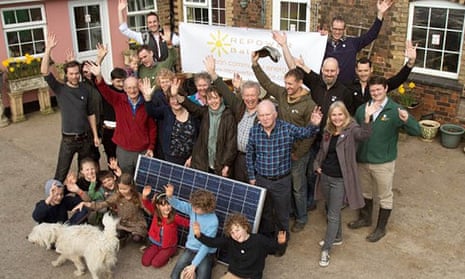Balcombe, the Sussex village that saw the UK’s biggest anti-fracking protests so far, is set to be powered largely by the sun, after residents won planning permission on Thursday to build a nearby solar farm.
But campaigners said they are now racing government subsidy cuts to solar power to get the project underway.
The 5 megawatt (MW) project in Sussex will see 18,500 panels installed, generating enough power to match Balcombe’s electricity needs and to power a nearby village.
Local residents started discussing the prospects of solar energy in the village two years ago after thousands of people joined protests in 2013 against shale explorer Cuadrilla’s plans to drill there. The company ruled out hydraulic fracturing at the site in 2014 because of natural fractures it found in the rock.The UK’s only Green MP, Caroline Lucas, who was arrested with protestors two years ago, greeted the decision with delight.
“Balcombe is showing how things can be done differently – to the benefit of local people. I hope government ministers have their eyes on Balcombe today - and that the huge success there persuades them of the urgent need to rethink their short-sighted cuts to support for Britain’s renewables industry.”
The project now needs to beat a deadline for cuts to solar subsidies if it is to be financially viable. A consultation is currently underway on proposed plans to slash subsidies for rooftop solar panels by 87% from 1 January 2016, a move that renewable energy experts have warned will kill off a growing industry. It followed similar proposals by ministers over the summer to cut or end subsidies for larger solar farms and onshore wind, which the government has argued are necessary to protect taxpayers.
Charles Metcalfe, Balcombe resident and co-founder of the co-operative Repower Balcombe, told the Guardian: “In Balcombe we said no to the prospect of unconventional gas and oil within the confines of the village. So I feel relieved, proud and pleased that the local district council planning committee have come to the only sensible conclusion, whilst still bewildered by the fact that central government seems to be trying to pull the rug from under our feet in a more general sense.
“We would love to go ahead and do more projects like this but they have made it more difficult to be financially viable.”
The project must now be built and plugged into the grid by the end of March. It requires £5m of investment, which will come from crowdfunding, local residents and investments from shareholders, said 10:10, an environmental charity supporting the project. Local efforts have already seen smaller projects installed at a primary school and a nearby farm. At a community consultation in May, 87% of people present supported the project.
Alice Bell, head of campaign communications at 10:10 said: “Whereas fracking divided Balcombe, solar seems to unite them. Any delay in this project would be a challenge. With recent changes to renewables policy, like a lot of community energy projects, we’re racing the cuts now.”
The government has said it will go “all out” for shale gas, announcing a fresh round of licences in August that are expected to open up 1,000 sq miles of England to fracking.
- This article was amended on 2 October to clarify that the solar farm matches most of the villages’ electricity, not energy, needs.
